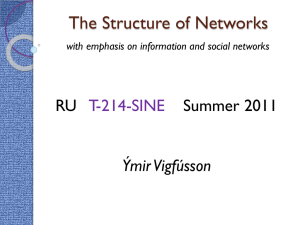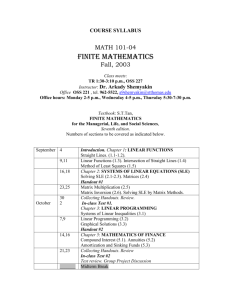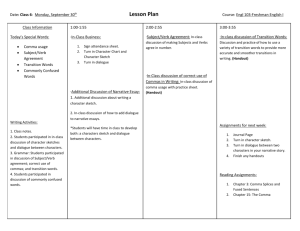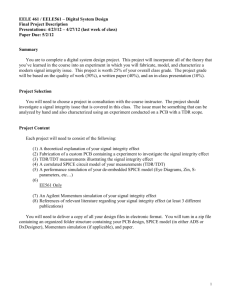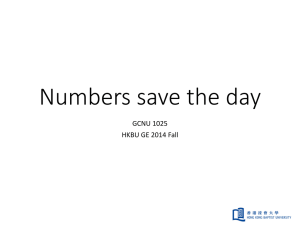Environmental Sociology Syllabus Spring 2014 University of
advertisement
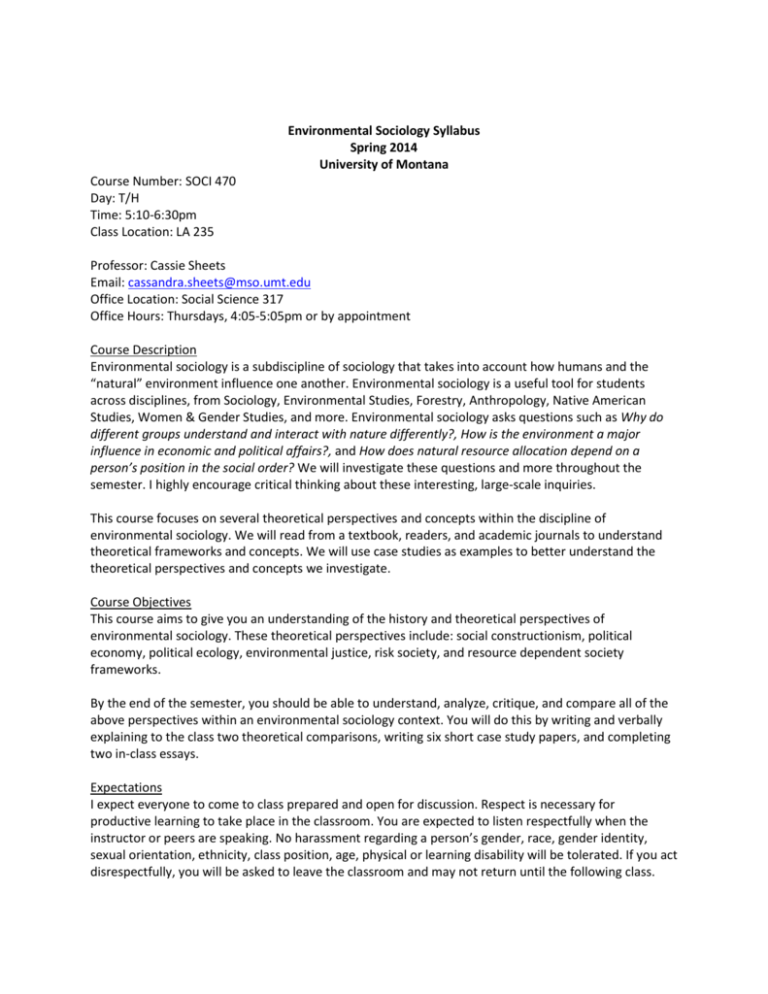
Environmental Sociology Syllabus Spring 2014 University of Montana Course Number: SOCI 470 Day: T/H Time: 5:10-6:30pm Class Location: LA 235 Professor: Cassie Sheets Email: cassandra.sheets@mso.umt.edu Office Location: Social Science 317 Office Hours: Thursdays, 4:05-5:05pm or by appointment Course Description Environmental sociology is a subdiscipline of sociology that takes into account how humans and the “natural” environment influence one another. Environmental sociology is a useful tool for students across disciplines, from Sociology, Environmental Studies, Forestry, Anthropology, Native American Studies, Women & Gender Studies, and more. Environmental sociology asks questions such as Why do different groups understand and interact with nature differently?, How is the environment a major influence in economic and political affairs?, and How does natural resource allocation depend on a person’s position in the social order? We will investigate these questions and more throughout the semester. I highly encourage critical thinking about these interesting, large-scale inquiries. This course focuses on several theoretical perspectives and concepts within the discipline of environmental sociology. We will read from a textbook, readers, and academic journals to understand theoretical frameworks and concepts. We will use case studies as examples to better understand the theoretical perspectives and concepts we investigate. Course Objectives This course aims to give you an understanding of the history and theoretical perspectives of environmental sociology. These theoretical perspectives include: social constructionism, political economy, political ecology, environmental justice, risk society, and resource dependent society frameworks. By the end of the semester, you should be able to understand, analyze, critique, and compare all of the above perspectives within an environmental sociology context. You will do this by writing and verbally explaining to the class two theoretical comparisons, writing six short case study papers, and completing two in-class essays. Expectations I expect everyone to come to class prepared and open for discussion. Respect is necessary for productive learning to take place in the classroom. You are expected to listen respectfully when the instructor or peers are speaking. No harassment regarding a person’s gender, race, gender identity, sexual orientation, ethnicity, class position, age, physical or learning disability will be tolerated. If you act disrespectfully, you will be asked to leave the classroom and may not return until the following class. You are not allowed to use cell phones, iPods, or any computer programs other than for taking notes in class. If the instructor sees you doing any of the above, you will be given one warning and then will be asked to leave the classroom for the day. If you cheat, you will receive zero points on that assignment – case study write-up, theoretical comparison, or in-class exam – and will be subject to academic discipline and possible failure in the class. Depending on the severity of cheating, you will lose your opportunity for extra credit points for the entire semester. Plagiarism is a form of cheating. To avoid plagiarism, visit the following website for tips, work individually on your assignments, and make sure to cite sources using American Sociological Association (ASA) format, found at (http://www.asanet.org/students/QuickStyleguide.pdf). Email communication via your University of Montana email account is necessary to receive all messages about the course. You will also need to check your UM Moodle account regularly to receive important information. If you email me, you may expect a response within 24 hours if sent on a weekday and 48 hours if sent over the weekend. Case study write-ups will be turned in electronically using Moodle. Students with Disabilities The University of Montana is dedicated to providing fair instruction for students with disabilities. Please visit http://www.umt.edu/disability for more information. If you need disability accommodations, you need to contact me at least 5 days in advance so I have time to communicate with UM’s Disability Services to set up accommodations. If you have any questions, please contact me via email, speak with me after class, or visit my office hour. Communication in advance is key; grades will not be changed retroactively. Grades Grades will be earned through case study write-ups, in-class essay exams, and theoretical comparison assignments. Up to 10 extra credit points may be earned by meaningful in-class participation. Comments that are off topic or repeated will not count toward extra credit participation points. Any attendance at a review session will count toward extra credit participation points. The following scale will be used for grades: 95-100 = A 90-94 = A89-87 = B+ 76-74 = C 73-70 = C69-67 = D+ 86-84 = B 66-64 = D 80-83 = B63-60 = D- 79-77 = C+ 59 or lower = F If an assignment is late, with the exception of your or a direct family member’s hospitalization or death (with hospital verification) or having gained approval from the instructor ahead of time, your grade will drop down a full letter grade below what you would have earned if it was turned in on time. Each 24 hours past the due date and time is another drop of a full letter grade. If you do not show up during the assigned class time to complete an in-class exam, with the exception of your or a direct family member’s hospitalization or death (with hospital verification) or having gained approval from the instructor ahead of time, your grade will drop two letter grades what it would have been if you took the exam on time. If you do not contact the instructor within 24 hours of missing the exam, you will receive zero points for your in-class exam. Class Points 6 Case study write-ups, 20 points each 2 In-class exams, 30 points each 120 points 60 points 2 Theoretical comparisons, 20 points each 10 potential extra credit participation points 40 points 220 points total Case Study Write-Ups You are required to complete six case study write-ups during the semester. A video pertaining to the case study will be shown in class before the write-ups are due. If you miss watching the video in class, you will need to watch the video outside of class to complete the assignment. Videos will be on Reserve at the Mansfield Library for one week following being shown in class. You will have one week after the last segment of each video has been shown in-class before the write-up is due. Case study write-ups are based on several questions which will be handed out in class on the first day of viewing a video. That way, you may take notes as you watch the video, to later fully write up answers to the questions. You need to incorporate assigned reading material in your write-ups to receive full credit. You also need to cite readings in ASA (American Sociological Association) format to receive full credit. Further instructions on case studies will be distributed before the first case study is assigned. Please keep the in-depth case study instruction sheet, as you will need it throughout the semester. Theoretical Comparisons You are required to do a small amount of research outside of class twice during the semester as part of exam reviews; theoretical comparisons are due the week before the midterm and the week before the final. There is also a mock theoretical comparison at the beginning of the semester, which will not be graded. You must find a non-academic, “current events” article or story that is about an environmental topic interesting to you. Then you must write a one page paper comparing two of the theories we learned in class as applied to the article’s topic/scenario. Further explanation will be given in class before the first graded Theoretical Comparison is due. Exams There are two in-class essay exams during the semester, one approximately 2/3 through the semester and one during finals week. Exams will be in blue books and are closed-note, closed-book. Each exam is composed of three essay questions, and you will need to answer two of those three questions for each exam. Readings Most readings can be accessed electronically using UM’s Eres. It is up to you whether or not you want to read digitally or print out and read, but all assigned reading is required and you are expected to come to class ready to review the material. We will be reading from several books throughout the semester. Our main textbook is Michael Bell’s An Invitation to Environmental Sociology, 4th edition, with most assigned chapters available on Eres. The remaining required chapters will be given to you in hard copy. This book is also on Reserve at the Mansfield Library to read. There are also assigned article readings from multiple sources, all available on Eres. The following are assigned readings that are not available on Eres. You will either need to purchase these books (available at the UM Bookstore) or read them at the Mansfield Library, since they will be on Reserve: Robert D. Bullard and Beverly Wright’s Race, Place, and Environmental Justice After Hurricane Katrina, Richard Heinberg’s The Oil Depletion Protocol, and Robert William Sanford’s Water, Weather, and the Mountain West. When reading is assigned on the schedule, you need to show up to class on that day already having read the material. Schedule Week 1 Introduction to Environmental Sociology January 28th In-class: Introduction to course January 30th Read: “The Evolution of Environmental Sociology” by Dunlap In-class: Lecture on history of Environmental Sociology ________________________________________________________________________________ Week 2 February 4th Read: Bell pp. 1-7, skim “Sustainability” (pp. 7-24), “Environmental Justice” (pp. 24-33), and “The Beauty of Ecology” (pp. 33-36) sections in Bell, read Bell pp. 37-38 In-class: Facilitated discussion about Theoretical Comparisons Due: Theoretical Comparison 1 (not graded) Social Constructionism February 6th Read Bell. Ch. 8 “The Human Nature of Nature” In-class: Lecture on Social Constructionism ________________________________________________________________________________ Week 3 February 11th Read: BBC’s “Raising Cane,” BBC’s “Toads’ Australian march quickens,” “Have Australian cane toads finally met their match?” by Jeremy Hance, “Cane Toads Are Their Own Worst Enemy” by Stephen Luntz In-class: watch Cane Toads: An Unnatural History Political Economy February 13th Read: Bell Ch. 2 “Consumption and Materialism,” Ch. 3 “Money and Machines” In-class: Lecture on Political Economy ________________________________________________________________________________ Week 4 February 18th Read: State of Alaska’s “Red King Crab,” Science Daily’s “King Crab Goes Deep to Avoid Hot Water,” UAF’s “New findings show increased ocean acidification in Alaska,” US Global Change Research Program’s “US National Assessment of the Potential Consequences of Climate Variability and Change Region: Alaska” In-class: watch Pots of Gold Due: Case Study 1 write-up Political Ecology February 20th Read: “Who Owns America? Social Conflict over Property Rights” by Jacobs, “Property, Properties, and the Distribution of Wealth” by Gudeman In-class: Lecture on Political Ecology _____________________________________________________________________________________ Week 5 February 25th Read: “Officials struggle to regulate homeless camps in Missoula” by Kidston In-class: Article activity/discussion Due: Case Study 2 write-up February 27th Read: “Land (and How it Gets that Way)” by Garkovich In-class: watch Land (and How it Gets that Way) Part I _____________________________________________________________________________________ Week 6 March 4th In-class: watch Land (and How it Gets that Way) Part II Environmental Justice March 6th Read: Bell Ch. 5 “Body and Health,” Katrina book –start Part I In-class: Lecture on Environmental Justice _____________________________________________________________________________________ Week 7 March 11th Read: “Anatomy of Environmental Racism and the Environmental Justice Movement” by Bullard, “Principles of Environmental Justice,” Katrina book -finish Part I In-class: Environmental Justice activity Due: Case Study 3 write-up March 13th Read: Katrina book, Part II In-class: watch When the Levees Broke Part I _____________________________________________________________________________________ Week 8 March 18th Read: Katrina book, Part III, IV In-class: watch When the Levees Broke Part II Review March 20th In-class: Theoretical Comparisons Due: Theoretical Comparison 2, Case Study 4 write-up _____________________________________________________________________________________ Week 9 March 25th In-class: Review session, Writing Center speaker March 27th In-class: Essay exam _____________________________________________________________________________________ Spring Break! (March 29th-April 6th) ________________________________________________________________________________ Week 10 Risk Society April 8th In-class: Go over Midterm exams April 10th Read: Bell Ch. 9 “The Rationality of Risk” In-class: Lecture on Risk Society, Writing Center follow-up _____________________________________________________________________________________ Week 11 April 15th Read: PBS’ “Meltdown at Three Mile Island,” NPR’s “Three Mile Island 30 Years Later,” NPR’s “Fukushima, Three Mile Island, Chernobyl: Putting It All In Perspective” In-class: watch Meltdown at Three Mile Island Resource Dependent Society April 17th Read: Bell Ch. 4 “Population and Development” In-class: Lecture on Resource Dependent Society _____________________________________________________________________________________ Week 12 April 22nd Read: The Oil Depletion Protocol by Heinberg, Part I-III In-class: Resource Dependent Society activity Due: Case Study 5 write-up April 24th Read: The Oil Depletion Protocol by Heinberg, Part IV-VI In-class: watch The Crude Awakening __________________________________________________________________________________ Week 13 April 29th Read: Water, Weather, and the Mountain West by Sanford, Part I In-class: Theoretical Comparisons Due: Theoretical Comparison 3 May 1st Read: Water, Weather, and the Mountain West by Sanford, Part II In-class: Policy activity Due: Case Study 6 write-up _____________________________________________________________________________________ Week 14 May 6th Read: Water, Weather, and the Mountain West by Sanford, Part III-VI In-class: Review session May 8th In-class: Essay exam Enjoy summer break!


